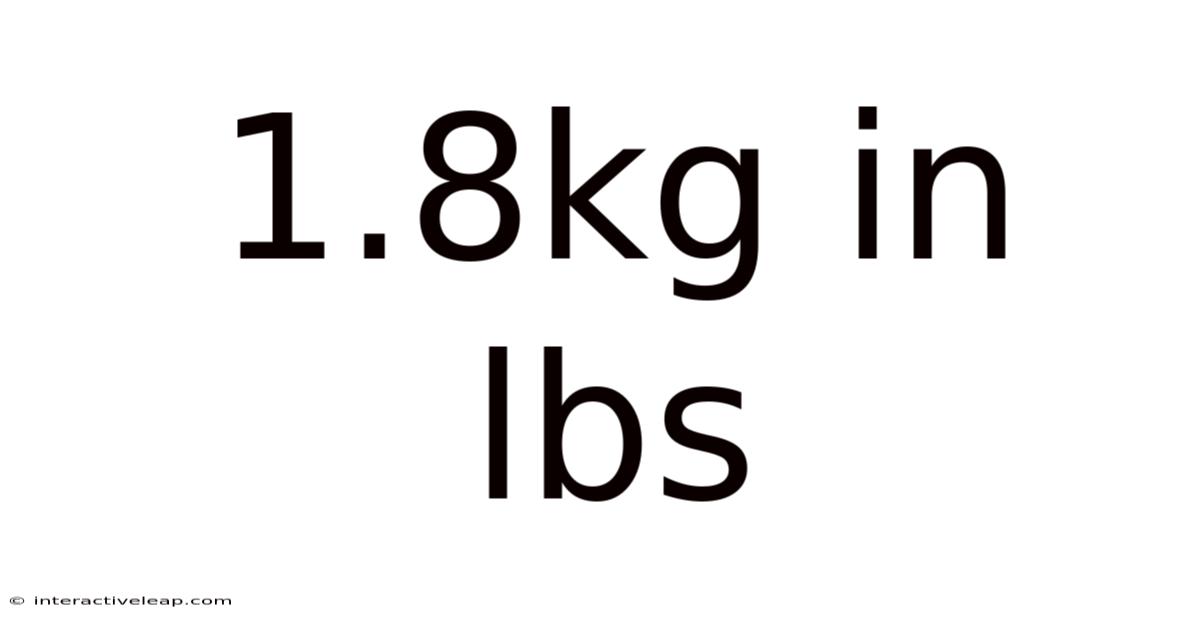1.8kg In Lbs
interactiveleap
Sep 19, 2025 · 4 min read

Table of Contents
Decoding 1.8kg in lbs: A Comprehensive Guide to Weight Conversion and Understanding Units
Knowing how to convert between different units of measurement is a fundamental skill, particularly when dealing with weight. This comprehensive guide will delve into the conversion of 1.8 kilograms (kg) to pounds (lbs), exploring the underlying principles, practical applications, and addressing common questions. This article will equip you with a thorough understanding of weight conversion and the relationship between the metric and imperial systems.
Understanding Kilograms and Pounds
Before jumping into the conversion, let's establish a clear understanding of the units involved:
-
Kilograms (kg): The kilogram is the base unit of mass in the International System of Units (SI), also known as the metric system. It's widely used globally for scientific, commercial, and everyday purposes. One kilogram is roughly equivalent to the mass of one liter of water.
-
Pounds (lbs): The pound is a unit of mass in the imperial system of units, predominantly used in the United States and a few other countries. While technically a unit of mass, it's often used interchangeably with weight in everyday contexts.
Converting 1.8 kg to lbs: The Calculation
The conversion factor between kilograms and pounds is approximately 2.20462. This means that one kilogram is equal to 2.20462 pounds. To convert 1.8 kg to lbs, we simply multiply the value in kilograms by the conversion factor:
1.8 kg * 2.20462 lbs/kg ≈ 3.968 lbs
Therefore, 1.8 kg is approximately equal to 3.968 lbs.
Practical Applications: Where This Conversion is Useful
Understanding the conversion between kilograms and pounds is crucial in numerous situations:
-
International Trade and Commerce: Global trade often involves dealing with goods and materials weighed in different units. Accurate conversion is essential for pricing, shipping, and inventory management.
-
Cooking and Baking: Many international recipes are written using either metric or imperial units. Knowing how to convert between kg and lbs allows you to accurately follow recipes from different sources.
-
Healthcare and Fitness: Weight is a critical factor in healthcare, especially in monitoring health conditions and managing fitness goals. The ability to convert between kg and lbs facilitates communication between healthcare providers and patients who may use different systems.
-
Shipping and Logistics: Package weight is a major factor in determining shipping costs. Accurate weight conversions are necessary to ensure correct pricing and avoid delays.
-
Engineering and Manufacturing: Precision is key in engineering and manufacturing. Converting between units accurately ensures that materials and components are correctly specified and used.
Beyond the Basic Conversion: Understanding the Relationship Between Units
The conversion factor of 2.20462 is an approximation. The precise conversion involves a more complex relationship rooted in the definitions of the kilogram and the pound. The kilogram is defined based on the Planck constant, a fundamental constant in physics, while the pound is historically linked to various prototypes and standards. The slight variations in the conversion factor across different resources arise from using different approximations in the conversion process.
Addressing Common Questions and Misconceptions
-
Is it always accurate to use 2.20462 as the conversion factor? While 2.20462 provides a highly accurate conversion, the precise value can vary slightly depending on the specific definition and measurement standards used. However, for most practical purposes, this approximation is sufficient.
-
Why are there different conversion factors sometimes listed? Different sources may round the conversion factor to varying degrees of precision. For example, some sources may use 2.2 or even 2.205. The choice depends on the required level of accuracy for the application.
-
What if I need more precision? For highly sensitive applications requiring extreme precision, refer to official conversion tables or use a calculator with a higher degree of accuracy.
-
Can I use online converters? Yes, numerous online converters offer quick and easy conversions between kilograms and pounds. However, it's essential to select a reputable source to ensure accuracy.
Expanding Your Understanding: Exploring Other Weight Units
While kilograms and pounds are common, other units of weight exist, including:
-
Grams (g): A smaller unit in the metric system, 1000 grams equal one kilogram.
-
Ounces (oz): A smaller unit in the imperial system, 16 ounces equal one pound.
-
Stones (st): An older unit of weight in the imperial system, 1 stone equals 14 pounds.
-
Metric Tons (t): Equal to 1000 kilograms, commonly used for larger quantities.
Understanding these relationships allows you to perform more complex conversions and navigate different weight systems effectively.
Conclusion: Mastering Weight Conversions
Converting 1.8 kg to lbs, while seemingly a simple task, opens the door to a broader understanding of units, their relationships, and the importance of accurate conversions in various fields. The knowledge gained through this guide enables you to confidently handle weight conversions in diverse contexts, from everyday life to professional applications. Remember that the accuracy required will dictate the precision of your conversion factor and method. By understanding the underlying principles and common practices, you can navigate the world of weight measurement with precision and confidence. Always double-check your conversions, especially when precision is critical. This knowledge will serve you well in numerous aspects of life, from cooking and baking to international trade and scientific endeavors.
Latest Posts
Latest Posts
-
0 7 X 0 5
Sep 19, 2025
-
52 3kg In Stone
Sep 19, 2025
-
Four Thousand Pounds
Sep 19, 2025
-
40 Off 65
Sep 19, 2025
-
Addressable Fire Alarm
Sep 19, 2025
Related Post
Thank you for visiting our website which covers about 1.8kg In Lbs . We hope the information provided has been useful to you. Feel free to contact us if you have any questions or need further assistance. See you next time and don't miss to bookmark.